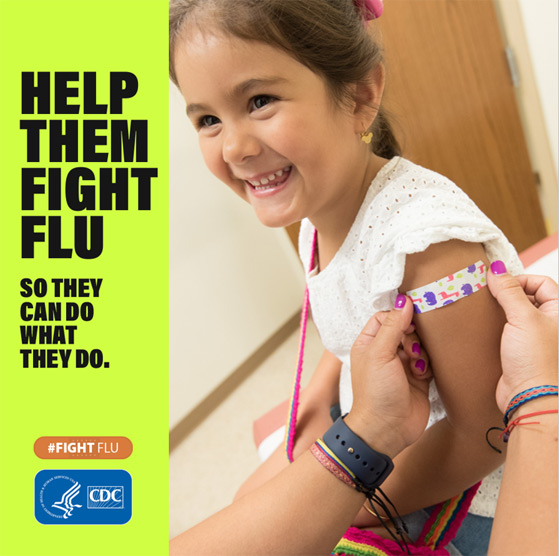Flu International Program Highlights
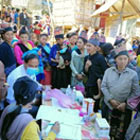
Seasonal influenza viruses circulate globally in people and are estimated to cause between 291,000 and 646,000 deaths worldwide, annually. Recently, indigenous hill tribes living in a remote northern province of Laos experienced a devastating outbreak of seasonal influenza A(H1N1)pdm09 which caused 16 deaths in December and January. The high flu-related mortality sparked attention and local public health partners trained with U.S. CDC support responded quickly to the outbreak in Phongsaly Province by rapidly delivering influenza antiviral drugs for treatment, providing health education and hygiene/sanitization interventions to slow the spread of disease, and funneling influenza vaccine to the crisis area for longer-term prevention of flu among the hill tribes. The last outbreak-related death occurred during the early days of the response; the other fifteen had all occurred previously.

Between January and May of 2017, the Ministry of Health of Vietnam (MOHV), with financial and technical support from The Partnership for Influenza Vaccine Introduction (PIVI) and the U.S. Centers for Disease Control and Prevention (CDC), successfully vaccinated nearly 11,000 health care workers with seasonal influenza vaccine in 29 health care facilities throughout the country.
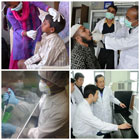
A study by CDC authors published today in the journal Emerging Infectious Diseases found that CDC’s international capacity-building efforts over a 10-year period (2004-2013) have led to substantial improvements in foreign countries’ ability to conduct influenza surveillance and detect emerging virologic threats.
Kigali, Rwanda (9 March 2016) – More than 150 global health experts from 29 countries are gathering for the 5th African Network for Influenza Surveillance and Epidemiology (ANISE) meeting in Kigali, Rwanda, from 9-11 March 2016, to encourage influenza research in Africa, bolster local access to vaccines, and share strategies and assessment tools for building efficient, standardized surveillance systems on the continent. Experts are using the Kigali meeting to promote African gains and forge a sustainable path forward for the ANISE network.
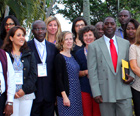
CDC’s Influenza Division and the Epidemic Intelligence Service (EIS) in partnership with the African Society of Laboratory Medicine (ASLM) and the Institut National d’Hygiene Publique (INHP), hosted the Workshop on Monitoring and Evaluation of Surveillance Systems with Emphasis on Influenza Sentinel Surveillance. The course was held in Abidjan, Côte d’Ivoire, October 12–16, 2015 at the Sofitel Abidjan Hotel Ivoire.
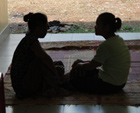
As flu season is wrapping up in the United States, other parts of the world are bracing for the start of their seasons. Thanks to CDC guidance and donations from Partnership for Influenza Vaccine Introduction (PIVI), this year Laos is vaccinating against seasonal influenza for the third year running, and Nicaragua is vaccinating pregnant women against flu for the second year in a row.

This season, thanks to a growing coalition of donors and facilitation by CDC, Laos is vaccinating against seasonal influenza for the second year running, and Nicaragua is expanding their existing flu vaccination program to pregnant women.
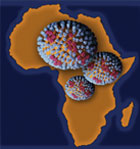
The December 15 ‘Influenza in Africa’ supplement gives new data on the burden and epidemiology of seasonal flu in Africa and sheds light on the impact of the 2009 H1N1 pandemic, which tested many countries’ relatively new preparedness plans, laboratory networks and surveillance systems.

In August 2011, former CDC Director Dr. Thomas Frieden visited India and saw firsthand CDC’s important work. Dr. Frieden returned with the Secretary of the Department of Health and Human Services Kathleen Sebelius in January 2012 to learn more about CDC’s collaborations around influenza surveillance and research in India.

Recently, the CDC’s Influenza Division in partnership with the National Institute for Communicable Disease (NICD) hosted a Data Management Training Course for influenza surveillance data managers and epidemiologists at the NICD training facility in Johannesburg, South Africa.
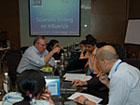
This year the Influenza Division co-hosted a series of three four-day-long writing workshops in Thailand, Kenya, and the Republic of Korea. The intent of the writing workshops was to help cooperative agreement recipients write about their work and ultimately to help them share their important findings with the public health community.
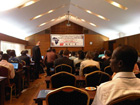
CDC influenza representatives met with experts from twenty-three African countries to discuss their influenza surveillance achievements. As a next step, the group is looking forward to publishing an article highlighting fifty years of influenza surveillance in Africa.

Enhancing and expanding the international pandemic response system was the topic of the World Health Organization’s (WHO) recent conference in Tunisia, “Strengthening the Global Influenza Surveillance Network (GISN).”
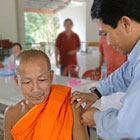
On April 24, 2012, the Lao People’s Democratic Republic (Lao PDR, or Laos), a small and relatively resource-poor southeast Asian country, launched a seasonal influenza vaccination program to protect adults at high risk of serious flu-related complications, including pregnant women, in that country.
